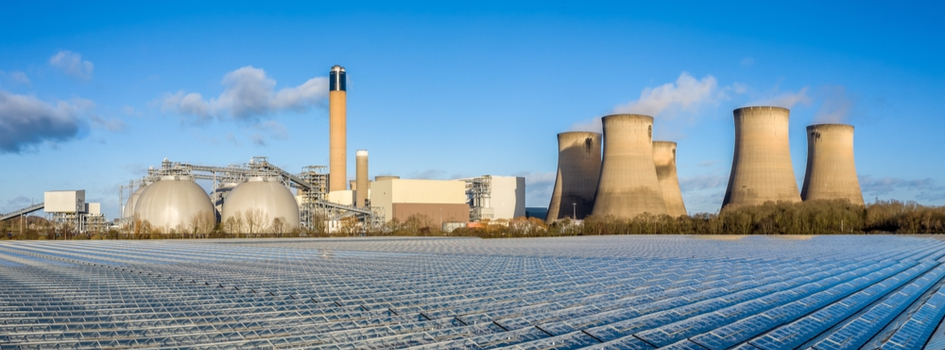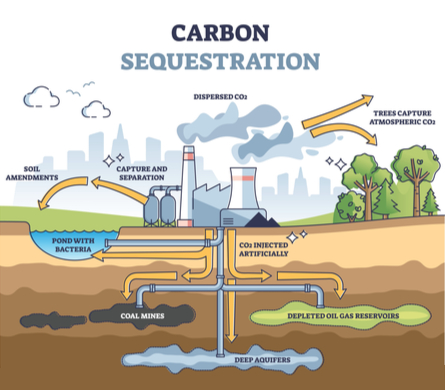
The Importance of CCUS In the Oil and Gas Industry
In today’s faced-paced world of commerce and industry, emissions generated from natural gas recovery and processing can leave a significant carbon footprint on the natural environment. However, there is an effective way to circumvent the issues of natural gas emissions—carbon, capture, utilization, and storage systems.
How Does CCUS Work?

Carbon capture, utilization, and storage (CCUS) is mediated by various technologies that repurpose carbon emitted by industrial processes. CCUS is a combination of utilization and storage, where carbon emissions can either be re-introduced in manufacturing or pumped into underground formations for safe storage.
Common technologies used in CCUS are:
- CO2 electrolysis
- Carbon neutral fuels
- CO2 feedstock for chemical synthesis
- Enhanced oil and gas recovery
- Microalgae biofuel
- Plant-based carbon capture
These methods represent remarkable strides in repurposing carbon from various industries that significantly contribute to the global carbon emission burden.
CCUS Opportunities and Applications for O&G
Since the onset of carbon sequestration and storage, the oil and gas industry has been one of the earliest adopters. Industry operators have since recognized the benefits of integrating CCUS technology in their processes. Several oil and gas processes generate highly concentrated streams of CO2 that can be used for low-cost CCUS applications.
Carbon capture, utilization, and storage have opened several possibilities in the oil and gas industry, including the following:
- Enhanced oil and gas recovery from dwindling gas formations
- Ethanol production
- Oil and gas refining
- Low carbon hydrogen generation
- Gas-fired power generation
- Direct air capture
Enhanced Oil and Gas Recovery
Rather than release carbon-containing gases into the environment, oil and gas operators can channel them into natural gas formations to improve dwindling pressures and sustain productivity.
Ethanol Production
The industrial process of manufacturing large quantities of ethanol can be optimized by integrating carbon capture and utilization technologies.
Oil and Gas Refining
Several points in the oil refining process generate large volumes of carbon dioxide gas. For example, CO2 produced from steam methane reformers can be captured safely for re-use and storage in several O&G applications.
Low Carbon Hydrogen Generation
Low carbon energy generation represents one of the newer, cleaner fuel sources in large-scale industrial operations. Low carbon hydrogen fuels produce no carbon when they burn and are being hailed as the new liquefied natural gas.
Gas Fired Energy Generation
This technology uses CO2 as the base resource in energy generation for both industrial and domestic use. Carbon capture done this way ensures a higher energy generation output while simultaneously lowering the carbon footprint.
How Does CCUS Technology Benefit the Oil and Gas Industry?
Let’s explore some key advantages of applying carbon capture and utilization in the oil and gas industry.
Affordable and Reliable Energy Source
Several oil and gas industry operations are associated with generating large volumes of carbon dioxide gas. Carbon dioxide gas provides a cheap source of energy for industry leaders.
Improve ESG Performance
The deployment of carbon sequestration methods significantly improves the environment, society, and governance for oil and gas industry operators. Apart from targeting maximum output from their processes, they also preserve the natural environment. The use of carbon capture technology ensures that carbon-based emissions are kept below recommended levels at all times.

Contributes to International Climate Goals
A direct outcome of improved ESG is the significant contribution to international climate goals. With increased carbon sequestration, there will be drastic reductions in carbon emissions into the environment, with an overall drop in the effects of greenhouse gases (planet warming and rising sea levels with increased risks of flooding).
Helps Maintain Regulatory Compliance
More countries are signing up to reduce their carbon emissions and improve the global climate picture. Consequently, various local and national environmental regulatory bodies have tightened emission regulations for industrial operators within their jurisdictions. The use of carbon sequestration and re-use technology will boost the ability of oil and gas players to maintain regulatory compliance.
Contact IFS for Advanced O&G Carbon Sequestration Solutions
At Integrated Flow Solutions, we offer the very best CCUS technology relevant to oil and gas industry applications. Our products and services are designed to help our partners achieve optimized productivity without compromising their environmental safety commitments.
To learn more about the CCUS solutions we offer, contact us today.
